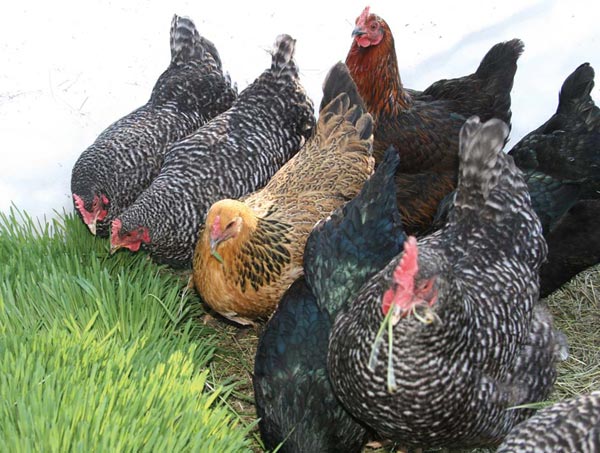Aquaponics farming in Kenya: Robert Mwakio has developed an innovative way to make use of a small urban space to keep fish and chicken, a form of farming he calls aquaponic poultry.
“My farm is on my balcony at my home in BuruBuru estate. I keep chicken, fish and also plant crops. This model of farming is called aquaponic poultry,” he says. Indeed, not many farmers are familiar with aquaponic poultry and Mwakio agrees as he offers an explanation: “This is an integrated farming model where you rear fish, poultry and have hydroponic plants all in one structure. Here, chicken structure is constructed over the whole aquaponics system to allow the chicken dropping fall on the crops as fertiliser. Water from the fish pond is also recycled and used to water the crops. That way nothing goes to waste.”
“Using this model that falls under integrated farming, one can keep fish, poultry and grow crops on a small space. And the beauty of this kind of farming is that little goes to waste because everything is reused,” says Mwakio who has a PhD in Urban Planning and Mechanics.
Having perfected the art of smart farming and combined with design background, Mwakio has turned this knowledge into a commercial venture and is making a tidy some.
Mwakio charges around Sh200,000 for aquaponics set up structure and an aquaponic poultry system costs between Sh250,000 and Sh300,000.
And so far, the innovative farmer says he has designed aquaponic poultry system for farmers in Nairobi’s Kayole, Kisumu, Busia and Kakamega. When starting off, Mwakio first constructed his first structure on his mother’s backyard farm in Kisumu. The idea worked wonders.
“After a few months, my mother harvested so many fish and a lot of kales, tomatoes, spinach and onions, she distributed the harvest to friends and relatives for free,” Mwakio recalls.
From that initial success, Mwakio’s eyes were opened to the possibilities that lie ahead with integrated farming. With that assurance, the ambitious agri-prenuer set base in Buru Buru and went big with integrated farming.
He decided to partner with some youth and they started making the smart farming structures for urban farmers. “I started doing it for friends and they were impressed. My work spoke for itself and that’s how orders started streaming in,” Mwakio says.
Within no time, word spread round about how he was helping small scale farmers with an innovative model of farming.
The business has now stabilised and Mwakio is enjoying the fruits of his labour. He gets orders for clients and tailors the structure depending on their unique needs. A simple system can hold between 120 to 200 chicken depending on the breed.
The innovative agricultural system is a structure measuring 50 x20 feet. The fish tanks and vegetable containers with gravel gravel are connected by pipes which are connected to a pump.
The vegetable tanks are suspended over the fish tank so that when the water is pumped through the fish tank outlet it is directed to the vegetable container suspended above the fish tanks.
The water is filtered through the vegetable container through porous gravel and move back to the fish tank through an outlet.
Mwakio explains the fish in the tanks excrete in the water and this is waste is poured onto the vegetable bed where plants grow, and they use the nutrients.
On his Buru Buru farm Mwakio grows onions and sukuma wiki for home consumption and keeps 1,400 nile tilapia for sale. With each fish going for an average price of Sh 250, on a good season, Mwakio pockets Sh350,000 from the sale of fish. He sells his produce in supermarkets and local hotels.









Hi Mr Mwakio, Glad to learn that you are doing well with your aquaponic poultry system. My wife and I used a fish tank ,30 m3 volume for road catchment of rainwater in which we raised Tilapia and ducks while adding chicken manure at Kibwezi in the late 1970s.
Regards,
Erik
Thumb up Mr Mwakio. Looking forward visiting your farm.
Kudos Mr Mwakio. Give us your contact.
Thanks Mr. Mwakio for the good business you are into. Am so encouraged, pliz give me your contacts to come and visit your site as i also want to do the same kind of farming and have no one to help me out. my contacts is 0725 500428.
Hi Mr Mwakio, I love what you are doing, kindly give me your contact please.
Thanks for the inspiration. Please tell me how I can get training through you.Mr NMwakio. My number is 0715507304 Rosa
To make this article useful, you should share Mwakio’s contacts or can you link me up to Mwakio?
Thank you Mr Mwakio for the wonderful work that you are doing, I am so inspired sir! Can I please have your contact details , purpose:
– to learn more if you offer training and practical learning
– where to get the equipment from
– how to start
Kind regards
Mrs Bindley